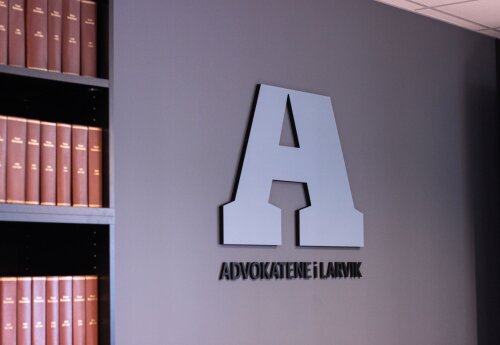Best Corporate Governance Lawyers in Norway
Share your needs with us, get contacted by law firms.
Free. Takes 2 min.
Or refine your search by selecting a city:
List of the best lawyers in Norway
About Corporate Governance Law in Norway
Corporate governance refers to the systems, processes, and principles by which companies are directed and controlled. In Norway, corporate governance law ensures that companies operate transparently, ethically, and in the interest of shareholders and stakeholders. The legal framework is based on a mix of statutory rules and non-binding guidelines, aimed at promoting responsible business conduct, accountability, and effective decision-making within organizations. Norway’s approach incorporates elements of both mandatory regulation and voluntary compliance, with an emphasis on sustainability and trust, which are core values in Norwegian business culture.
Why You May Need a Lawyer
There are several scenarios where seeking legal advice in corporate governance becomes essential. Business owners, board members, shareholders, and executives often require legal assistance to:
- Ensure compliance with the Companies Act and relevant corporate governance codes
- Draft, review, or update company bylaws and articles of association
- Manage board meetings and shareholder rights
- Navigate mergers, acquisitions, and company restructuring
- Handle disputes between shareholders or board members
- Address risks related to director liability or conflicts of interest
- Develop and implement compliance programs and policies
- Advise on executive compensation and incentive plans
- Maintain best practices in reporting, transparency, and financial disclosures
- Prepare for public listing or respond to regulatory investigations
A lawyer with expertise in Norwegian corporate governance can help clients understand their rights and obligations, minimize legal risks, and foster effective corporate leadership.
Local Laws Overview
Corporate governance in Norway is shaped by several key laws and regulations:
- The Norwegian Companies Act (Aksjeloven and Allmennaksjeloven) - Regulates the operation of private and public limited liability companies, including board composition, duties of directors and the general assembly, conflict of interest rules, and shareholder protection.
- The Norwegian Code of Practice for Corporate Governance - A non-binding but highly influential code, setting standards for best practice in areas such as equal treatment of shareholders, independence of the board, risk management, and transparency. Public limited companies listed on the Oslo Stock Exchange are required to report their compliance with the code.
- Securities Trading Act - Imposes obligations regarding market abuse, insider trading, and disclosure for listed companies.
- Accounting Act and Auditing Act - Establish requirements for financial reporting, auditing, and publication of company accounts.
Norwegian law emphasizes the duty of loyalty and due care by board members, the importance of stakeholder engagement, and transparent communication.
Frequently Asked Questions
What is corporate governance in the context of Norwegian companies?
Corporate governance is the system by which companies are directed, managed, and controlled. In Norway, it refers to the processes and regulations that ensure transparency, fairness, and accountability in running a company.
Are all companies in Norway required to follow the same corporate governance standards?
No. While the Companies Act applies to most companies, stricter requirements and the Code of Practice for Corporate Governance apply mainly to public limited liability companies, especially those listed on the stock exchange. Smaller private companies have more flexibility.
What are the main duties of a company board of directors in Norway?
The board is responsible for the overall management of the company, ensuring proper organization of operations, overseeing executive management, safeguarding shareholder interests, and preparing annual accounts and reports. Board members must act with loyalty and due care.
How are conflicts of interest managed within Norwegian companies?
Directors are required by law to avoid conflicts of interest. They must inform the board if they have a personal interest in matters under consideration and abstain from voting or participating in such decisions.
What rights do shareholders have in Norwegian companies?
Shareholders have the right to participate and vote at general meetings, receive dividends, access certain company information, and propose items for discussion. Their influence depends on the class and number of shares held.
Is compliance with the Norwegian Corporate Governance Code mandatory?
For companies listed on the Oslo Stock Exchange, reporting compliance with the code is required using the “comply or explain” principle. Adherence itself is not mandatory, but deviations must be explained in the annual report.
What are the typical penalties for breaching corporate governance laws in Norway?
Penalties can include fines, legal liability for damages, reversal of improper transactions, disqualification from serving as a director, or in severe cases, criminal prosecution for fraud or market abuse.
How are executive salaries and bonuses governed?
Executive remuneration policies must be approved by the general meeting for listed companies, with transparency requirements in place. The board proposes guidelines and must report on their implementation in the annual report.
Are there gender diversity requirements for Norwegian company boards?
Yes. Public limited liability companies are subject to mandatory gender quotas, requiring at least 40 percent of each gender represented on the board. Failure to comply can result in refusal of company registration.
How can disputes between shareholders or board members be resolved?
Most disputes are resolved through negotiation or mediation. If necessary, legal action can be taken in Norwegian courts. Some companies include arbitration clauses in their articles of association for faster resolution.
Additional Resources
If you need more information or official guidance, consider the following resources:
- Norwegian Ministry of Trade, Industry and Fisheries - Oversees business regulations and corporate legislation.
- Brønnøysund Register Centre - Administrates company and accounting registers, and provides public company information.
- Oslo Stock Exchange (Euronext Oslo Børs) - Publishes rules and guidelines for listed companies.
- The Norwegian Corporate Governance Board (NUES) - Maintains and updates the Norwegian Code of Practice for Corporate Governance.
- The Norwegian Bar Association - Register of qualified lawyers and legal practitioners specializing in corporate law.
- Advokatforeningen - Norway’s largest association for lawyers, often providing resources and advice for businesses.
Next Steps
If you require legal assistance in matters of corporate governance in Norway, follow these steps:
- Identify your specific legal needs or questions related to your company’s governance.
- Gather relevant documentation, such as bylaws, shareholder agreements, and recent board meeting minutes.
- Contact a lawyer or law firm specializing in corporate law and corporate governance in Norway.
- Schedule a consultation to discuss your situation in detail and outline possible solutions.
- Follow the lawyer’s advice on compliance, dispute resolution, or improvement of governance structures.
- Stay updated on changes in laws and best practices to maintain sound and compliant corporate governance.
Legal support can safeguard your company’s reputation, minimize risks, and contribute to sustainable growth and accountability.
Lawzana helps you find the best lawyers and law firms in Norway through a curated and pre-screened list of qualified legal professionals. Our platform offers rankings and detailed profiles of attorneys and law firms, allowing you to compare based on practice areas, including Corporate Governance, experience, and client feedback.
Each profile includes a description of the firm's areas of practice, client reviews, team members and partners, year of establishment, spoken languages, office locations, contact information, social media presence, and any published articles or resources. Most firms on our platform speak English and are experienced in both local and international legal matters.
Get a quote from top-rated law firms in Norway — quickly, securely, and without unnecessary hassle.
Disclaimer:
The information provided on this page is for general informational purposes only and does not constitute legal advice. While we strive to ensure the accuracy and relevance of the content, legal information may change over time, and interpretations of the law can vary. You should always consult with a qualified legal professional for advice specific to your situation.
We disclaim all liability for actions taken or not taken based on the content of this page. If you believe any information is incorrect or outdated, please contact us, and we will review and update it where appropriate.
Browse corporate governance law firms by city in Norway
Refine your search by selecting a city.















